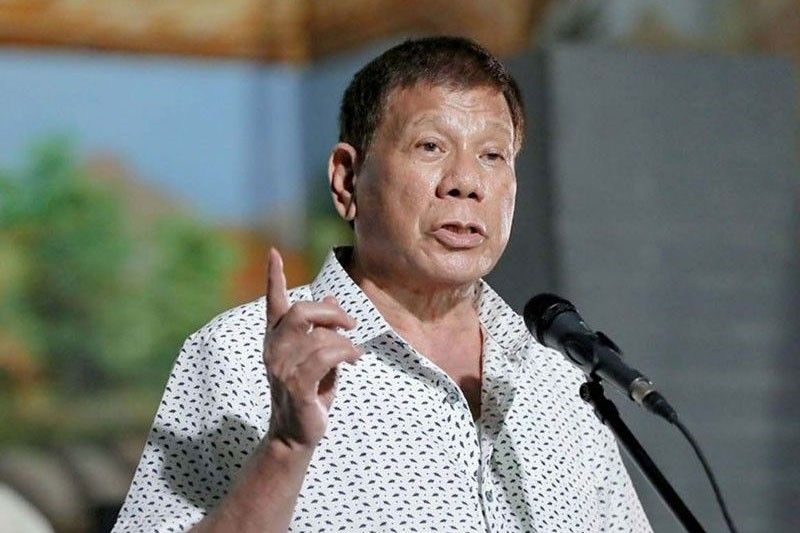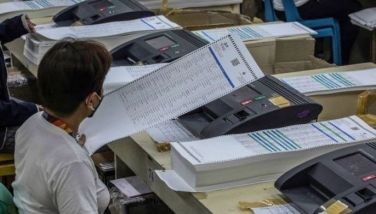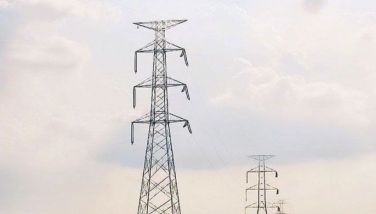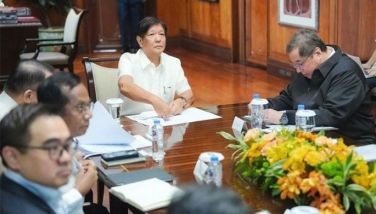Duterte to Pinoys: Don’t vote for KABAG candidates

MANILA, Philippines — President Duterte has urged Filipinos not to vote for party-list groups that he claimed are supporting communist rebels who seek to overthrow the government.
In his public address last Monday, Duterte said the rebels have used the party-list system to infiltrate Congress and referred to them by the acronym KABAG (stomach pains in Filipino).
“You will see from their behavior and the way they espouse their advocacy for a party, their drift is really to the left,” Duterte said. “So you won’t forget, remember the KABAG: Kabataan-K, Anakpawis-A, Bayan Muna-B, (Alliance) of Concerned Teachers- A and Gabriela.”
He accused them of being legal fronts of the Communist Party of the Philippines (CPP), political arm of the communist rebels. In the House of Representatives, these party-list groups form the so-called Makabayan bloc.
“Do not vote for them,” the President said. “Let us put an end to that. Let us give everything to the barangays. We are wasting lives. We are wasting money.”
Duterte linked the party-list groups to the New People’s Army (NPA), which has been fighting the government for decades.
“The problem is they are supporting or they are really like legal fronts of the Communist Party of the Philippines,” he said in Filipino. “The problem is they are using money, they get money from the government and they are supporting those sons of b*****. They are supporting a bunch of (people) without ideology.”
Duterte also claimed that communists are infiltrating international bodies and are using state funds to support insurgents.
While offering no proof to his allegations, his claim echoed the narrative being pushed by Presidential Communications and Operations Office (PCOO) Undersecretary Lorraine Badoy, a spokesperson for the National Task Force to End Local Communist Armed Conflict (NTF-ELCAC).
Last March 21, Badoy issued a statement in which she coined the term “kabag” for the party-list groups that she described as “urban operatives” of the CPP-NPA.
Then on March 14, she posted on the Facebook account and website of the NTF-ELCAC that Vice President Leni Robredo was “making pact” or conspiring with the CPP-NPA after her candidacy for president was formally endorsed by the Makabayan bloc.
Badoy reiterated her previous allegation that Makabayan coalition groups were fronts and like “atsoys and atsays” (servants) of the CPP, “who do the bidding of their terrorist bosses.”
Raps vs Badoy
Badoy is facing yet another complaint before the Office of the Ombudsman for linking Robredo and the Makabayan bloc to communist rebels.
In a 15-page joint complaint-affidavit filed yesterday, progressive groups Amihan Peasant Women Federation, Pambansang Lakas ng mga Mamalakaya (Pamalakaya), Kilusang Magbubukid ng Pilipinas (KMP), Kalipunan ng Damayang Mahihirap (Kadamay), Makabayang Koalisyon ng Mamamayan (Makabayan) and Kilusang Mayo Uno (KMU) have urged the Ombudsman to investigate Badoy for various criminal and administrative offenses.
The complainants specifically want Badoy to be held criminally liable for violations of Republic Act 3019 (Anti-Graft and Corrupt Practices Act), RA 6713 (Code of Conduct and Ethical Standards for Public Officials and Employees) and Batas Pambansa Blg. 881 (Omnibus Election Code).
The complaint said Badoy and NTF-ELCAC must be held administratively liable for grave misconduct, oppression and conduct prejudicial to the best interest of the service.
Makabayan senatorial candidate Elmer Labog also pressed for sanctions against Badoy for red-tagging people’s organizations.
“Among the ranks of workers, many have been put in danger because of red-tagging,” Labog said, citing the killings of several labor leaders.
Labog said NTF-ELCAC continues to sow fear by ceaselessly red-tagging unionists and labor leaders and even Robredo and her supporters.
Flosemer Chris Gonzales, acting spokesman for NTF-ELCAC legal affairs, laughed off the cases filed against officials of the task force, claiming they are “basically anchored on the premise that the complainants deny any link or that they claim to be not in any way connected to the CPP-NPA-NDF (National Democatic Front).”
Gonzales said all the charges against the NTF-ELCAC are trumped up and simply absurd.
“Red-tagging is a misnomer, a non-existent term that has no legal definition,” he said.
Gonzales maintained that the men and women composing the 12 clusters of the NTF-ELCAC stand united with their spokespersons in the advocacy to tell the truth to the Filipino people.
Comelec to investigate
Yesterday, the Commission on Elections (Comelec) vowed to look into the President’s claim that some communist groups have infiltrated Congress through the country’s party-list system.
“At this point, the Comelec promises to always look into these accusations, allegations, definitely and especially among the accredited party-list,” Commissioner George Garcia told reporters.
But Garcia said the public must understand the limited power of the Comelec to investigate, especially now when party-list groups have been accredited and given “vested rights” to participate in the May 9 elections.
“So until and unless disqualification cases for the cancellation of their registration for violating the law are filed, then we will have to respect the initial privilege granted to them to participate as party-list,” he said in English and Filipino.
“But definitely, this will be a continuing process on the part of the Comelec to likewise and always determine if they’ve violated anything in Republic Act 7941, the Party-list Law,” he added.
In Zamboanga City, independent presidential candidate Sen. Panfilo Lacson and his running mate Senate President Vicente Sotto III lamented the current state of the party-list system in Congress.
“The real intent of the party-list system was defeated,” Lacson told a press conference as he reacted to Duterte’s comment that many party-list congressmen are either communist rebels or controlled by or are billionaires themselves.
Sotto, one of the authors of the Party-list Law, said the list of marginalized groups identified in the statute was less than 10 when it was passed in 1995.
“We discussed and debate which groups should be considered marginalized, farmers, fisherfolk, urban poor, women, labor, youth, PWDs, seniors, or only around eight,” Sotto said.
“Now the nominees are billionaires,” he said.
The change resulted from an interpretation by the Comelec of the law and a subsequent ruling of the Supreme Court. – Robertzon Ramirez, Mayen Jaymalin, Elizabeth Marcelo, Artemio Dumlao, Paolo Romero, Edu Punay
- Latest
- Trending






























